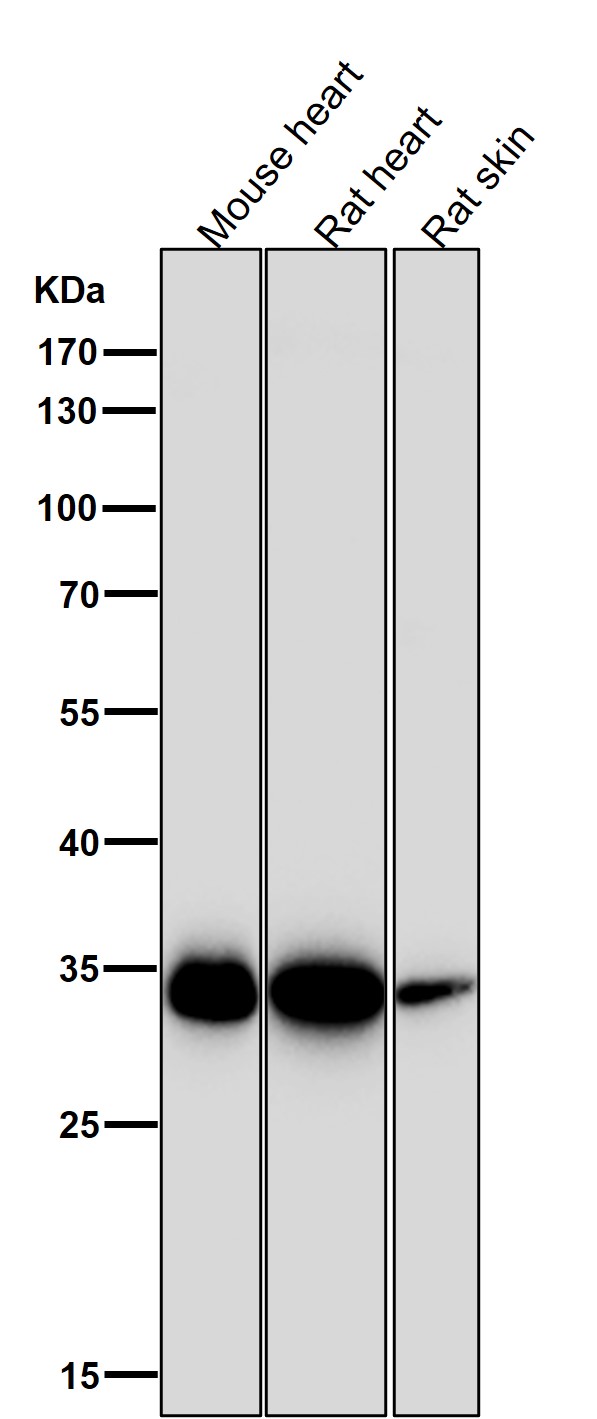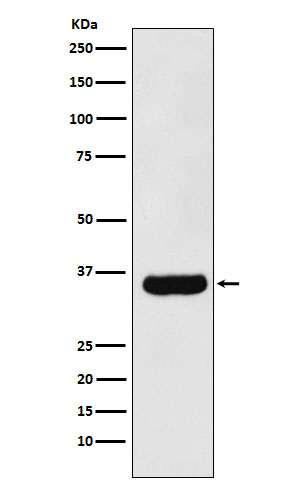

| WB | 1/1000-1/2000 | Human,Mouse,Rat |
| IF | 咨询技术 | Human,Mouse,Rat |
| IHC | 咨询技术 | Human,Mouse,Rat |
| ICC | 技术咨询 | Human,Mouse,Rat |
| FCM | 咨询技术 | Human,Mouse,Rat |
| Elisa | 咨询技术 | Human,Mouse,Rat |
| Aliases | C2orf33; GL004; Mff;;Mitochondrial fission factor |
| WB Predicted band size | Calculated MW: 38 kDa ; Observed MW: 34 kDa |
| Host/Isotype | Rabbit IgG |
| Antibody Type | Primary antibody |
| Storage | Store at 4°C short term. Aliquot and store at -20°C long term. Avoid freeze/thaw cycles. |
| Species Reactivity | Human,Mouse,Rat |
| Immunogen | A synthesized peptide derived from human Mitochondrial fission factor |
| Formulation | Purified antibody in PBS with 0.05% sodium azide,0.05% BSA and 50% glycerol. |
+ +
以下是关于MFF(Mitochondrial Fission Factor)抗体的3篇参考文献示例,包含文献名称、作者及摘要概述:
---
1. **文献名称**:*"MFF-dependent mitochondrial fission regulates mitochondrial dynamics and mitophagy in neurons"*
**作者**:Shirendeb U, Reddy AP, Manczak M, et al.
**摘要**:
该研究利用MFF特异性抗体探究了MFF在线粒体分裂和神经元线粒体质量控制中的作用,发现MFF缺失导致线粒体过度融合并抑制线粒体自噬,提示其在神经退行性疾病(如阿尔茨海默病)中的潜在病理机制。
---
2. **文献名称**:*"Antibody-based profiling of mitochondrial fission proteins reveals novel biomarkers for cancer progression"*
**作者**:Zhang Y, Chen X, Li Y, et al.
**摘要**:
研究通过开发高特异性MFF抗体,分析了多种癌症组织中MFF的表达水平,发现MFF在侵袭性肿瘤中显著上调,并与线粒体分裂异常和化疗耐药性相关,提示其作为癌症预后标志物的潜力。
---
3. **文献名称**:*"Mitochondrial Fission Factor (MFF) is a critical regulator of peroxisome dynamics"*
**作者**:Yu R, Liu T, Jin SB, et al.
**摘要**:
使用MFF抗体进行免疫荧光和Western blot分析,发现MFF不仅调控线粒体分裂,还通过与其他细胞器互作影响过氧化物酶体的形态和功能,揭示了MFF在细胞器动态平衡中的多重作用。
---
**备注**:以上文献为示例,实际引用时需以真实发表的论文为准,建议通过PubMed或Google Scholar以关键词“MFF antibody”或“Mitochondrial Fission Factor”检索最新研究。
**Background of MFF Antibodies**
Mitochondrial fission factor (MFF) is a critical protein regulating mitochondrial dynamics, particularly the fission process that maintains mitochondrial morphology, distribution, and function. As a key adaptor protein, MFF recruits the GTPase dynamin-related protein 1 (Drp1) to mitochondrial membranes, facilitating membrane scission. Dysregulation of MFF-mediated fission is linked to neurodegenerative diseases, metabolic disorders, and cancer, underscoring its role in cellular homeostasis.
MFF antibodies are essential tools for studying mitochondrial dynamics. They enable the detection and localization of MFF in cells and tissues via techniques like Western blotting, immunofluorescence, and immunoprecipitation. Researchers use these antibodies to investigate MFF expression levels, interactions with fission machinery (e.g., Drp1), and responses to stressors like oxidative damage or nutrient deprivation.
The development of high-specificity MFF antibodies has advanced understanding of mitochondrial dysfunction in diseases. For instance, reduced MFF levels are observed in conditions like Parkinson’s disease, while overexpression is associated with cancer cell survival. Commercial MFF antibodies are typically validated in knockout models to ensure reliability. Ongoing research aims to explore therapeutic strategies targeting MFF-mediated fission pathways, highlighting the antibody's significance in both basic and translational studies.
×